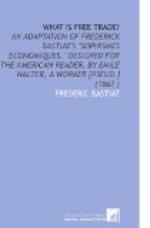With regard to the demand for labor, it certainly was no greater than formerly. THERE WERE, TO BE SURE, FIVE TIMES AS MANY FIELDS TO CULTIVATE, BUT THEY WERE FIVE TIMES SMALLER. If coal was mined, there was also less wheat; and because there were no more oranges bought, neither was there any more rye sold. Besides, the farmer could not spend in wages more than his capital, and his capital, instead of increasing, was now constantly diminishing. A great part of it was necessarily devoted to numerous buildings and utensils, indispensable to a person who determines to undertake everything. In short, the supply of labor continued the same, but the means of paying became less.
The result is precisely similar when a nation isolates itself by the prohibitive system. Its number of industrial pursuits is certainly multiplied, but their importance is diminished. In proportion to their number, they become less productive, for the same capital and the same skill are obliged to meet a greater number of difficulties. The fixed capital absorbs a greater part of the circulating capital; that is to say, a greater part of the funds destined to the payment of wages. What remains, ramifies itself in vain; the quantity cannot be augmented. It is like the water of a deep pond, which, distributed among a multitude of small reservoirs, appears to be more abundant, because it covers a greater quantity of soil, and presents a larger surface to the sun, while we hardly perceive that, precisely on this account, it absorbs, evaporates, and loses itself the quicker.
Capital and labor being given, the result is, a sum of production, always the less great in proportion as obstacles are numerous. There can be no doubt that international barriers, by forcing capital and labor to struggle against greater difficulties of soil and climate, must cause the general production to be less, or, in other words, diminish the portion of comforts which would thence result to mankind. If, then, there be a general diminution of comforts, how, working men, can it be possible that your portion should be increased? Under such a supposition it would be necessary to believe that the rich, those who made the law, have so arranged matters, that not only they subject themselves to their own proportion of the general diminution, but taking the whole of it upon themselves, that they submit also to a further loss in order to increase your gains. Is this credible? Is this possible? It is, indeed, a most suspicious act of generosity; and if you act wisely you will reject it.
CHAPTER XIII.
THEORY AND PRACTICE.
Defenders of free trade, we are accused of being mere theorists, of not giving sufficient weight to the practical.




